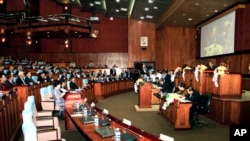Lawmakers for the opposition Cambodia National Rescue Party attended a plenary session at the National Assembly Wednesday, ending a parliamentary boycott that has lasted for weeks.
The boycott was a result of anti-opposition protests in November that led up to the severe beatings of two opposition lawmakers outside the Assembly, stirring fear among other parliamentarians for their personal safety and drawing widespread international criticism of political intimidation.
On Monday, 34 of 55 Rescue Party lawmakers attended a full Assembly session, joining the ruling Cambodia National Rescue Party in votes on three draft laws.
Rescue Party spokesman Yem Ponhearith told VOA Khmer the return of his party’s lawmakers to the Assembly were made possible by political agreements made with the CPP last week, in meetings between Interior Minister Sar Kheng and Rescue Party Vice President Kem Sokha.
In those talks, both sides agreed to maintain a “culture of dialogue,” in an effort to ease political tensions between the parties that have been roiling now for months. The Rescue Party aims to be involved on discussions of national issues, while exercising its rights to join Assembly debates and summon government officials for questioning, Yem Ponhearith said.
CPP spokesman Sok Eysan welcomed the return of the Rescue Party to Assembly proceedings. “That was their personal decision,” he said. The boycott had not impacted the progress of the Assembly’s work, he added.
On his Facebook page Wednesday, Prime Minister Hun Sen said the return of the lawmakers demonstrated “the ongoing progress of democracy in Cambodia, in which [members of parliament] from the ruling party and opposition work together to adopt useful laws for their nation.”
Ou Virak, head of the think tank Future Forum, said he was not surprised the lawmakers returned to the Assembly. The decision to boycott had been made “too fast, without thinking,” and allowed the ruling party to pressure them back to the Assembly, he said.
“I’d already foreseen that the People’s Party would put the pressure on CNRP, pressure related to their salaries and benefits, such as cars and positions at [the National Assembly’s] committees,” he said. “And because the election is coming in the next few years, they would not have the money to work on their policies or mission.”
Besides, he said, a boycott does not effectively stop work at the Assembly, where the ruling party has a large enough majority to keep it going, with or without the opposition.








